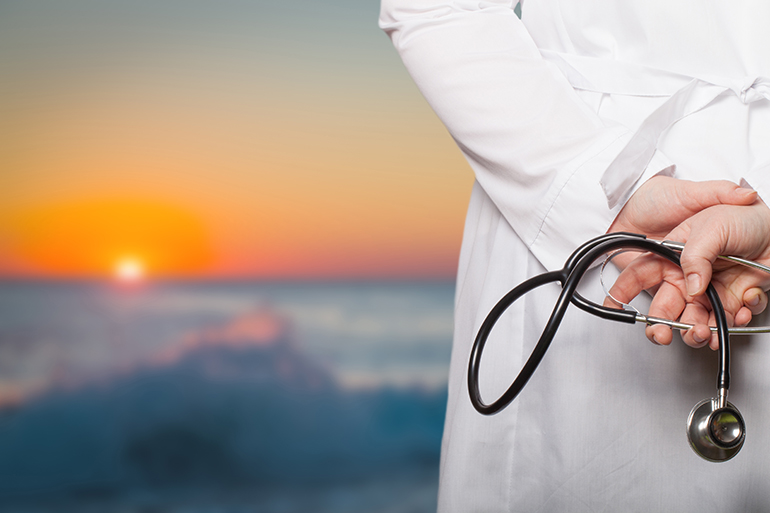Summer Medical Myths Debunked: Don’t Butter Your Tan

Getting ready for your best summer yet? How are you preparing? Maybe you’re planning on perfecting your tan, getting your laps done in the pool, lounging at the beach with your best buds and maybe this is the year you’re finally going to learn to surf. As you plan your summer fun, you’re likely to come across lots of information…some of it accurate, some of it, well, not. We’re here to help you sort through the summer’s biggest health myths so you’ll be on your way to an epic 2019 season.
Myth: Having a base tan will protect you from getting a sunburn.
Truth: Anything that darkens your skin, whether it’s the sun’s natural rays or the UV rays emanating from a tanning bed, is actually causing DNA damage. This DNA damage ultimately can raise your risk of skin cancer, including the most dangerous and hardest to treat form, melanoma. While it’s true that having slightly darker skin makes it slightly harder to burn, a “base tan” usually ends up being the equivalent of SPF 4…nowhere near protective. Rather than trying to show up at the beach already sporting a tan, try sporting sunblock with an SPF of at least 30 (once you get over an SPF of 50, there isn’t much benefit to going higher). Keep yourself protected, even in cloudy weather.
Myth: The sun is always dangerous.
Truth: Yes, the sun can lead to premature skin aging, eye damage and even skin cancer. But, here’s the catch—our bodies need natural sunlight in order to make Vitamin D, which is crucial for bone health, among other things. Up to 40% of us are deficient in Vitamin D thanks to the time we spend glued to our computer screens and desks, and not spending enough time outdoors. How do you balance the risks and benefits of the sun? You can spend 10–20 minutes outdoors in the sun without sunscreen…just be mindful of how strong the sun is and how sensitive your skin is. Also, speak to your doctor about other ways to build up your Vitamin D levels.
Myth: Butter soothes a sunburn.
Truth: If you’ve already cooked your skin, please don’t season it with butter! The greasiness of butter tends to make the heat from a sunburn less likely to dissipate and can delay healing. It’s better to treat a sunburn with cool water or compresses and aloe, especially if you can get it right from the plant source. Remember, if you have blistering of your skin, check in with your doctor and get some expert medical care.
Myth: Since chlorine kills bacteria, you can skip your morning shower if you go for a swim.
Truth: While jumping in the pool is refreshing, it doesn’t eliminate the need for showering. In fact, you may want to shower before and after swimming. As gross as it sounds, studies have shown that an alarming number of people regularly urinate in a pool and that many people don’t think twice about swimming after having diarrhea. Bacteria and viruses can contaminate the pool water and cause illness, and would require more chlorine than is safe to kill them all. Also, lotions, perfumes, detergents and even sweat can cause generation of chloramines, which give pools their distinctively strong smell. Contrary to popular belief, they are not a sign of cleanliness, but just the opposite.
Myth: If you go swimming right after you eat, you will drown.
Truth: Sorry, moms everywhere—this one is definitely a myth. Yes, if you’ve just eaten a large meal before jumping in, you may get a bit of abdominal cramping. But, other than this bit of discomfort, there is no risk of drowning. Typically, if you’ve eaten a modest snack or meal, you probably won’t even have cramps. In fact, major health organizations such as the American Academy of Pediatrics and the Centers for Disease Control do not warn against swimming after eating. Of course, it’s always important not to swim alone (and never let your children swim unattended) in case you’re not feeling well, but no need to wait before enjoying the water.
Myth: A cold beer will keep you hydrated on a hot day.
Truth: As much as we all wish this were true, it’s simply not the case. Sure, a cold beer (or a very large frozen margarita) is refreshing, but alcohol actually leads to dehydration through increasing the amount of urine produced by your body. When this is compounded by dehydration from exposure to high outdoor temperatures, your blood alcohol level may even rise more quickly, causing you to feel the effects of alcohol more easily. When drinking alcohol in the summer months, try to balance it with water, sparkling water or other non-alcoholic and non-caffeinated beverages. Remember to be cautious when enjoying a poolside cocktail-—as relaxing as it can be, it will impair your ability to safely swim, dive, operate a boat or supervise children in the water. Relax and enjoy, but make sure there is a designated driver (or boat captain).
Myth: Scratching a mosquito bite will make it better.
Truth: Unfortunately, this only makes you feel better for a second. While scratching an itchy area provides temporary relief, it also stimulates histamine release at the site of the bite which causes even more swelling, itching, redness and inflammation. You can try over-the-counter remedies such as diphenhydramine spray or hydrocortisone cream, or simply place an ice cube or pack over the itchy areas. To prevent mosquito bites, get rid of any standing water in your yard. Use an insect repellent with one of the following ingredients: DEET, picaridin, IR3535, oil of lemon eucalyptus, para-methane-diol or 2-undecanone. Consider wearing long pants and long sleeves if you’re going to be out in an area where there are many mosquitoes, and remember to use screens on your windows and doors when you’re letting the breeze into your house.
Myth: Long Island is a good place to get bitten by a shark.
Truth: While it’s true that Long Island waters are home to a wide variety of shark species, you don’t need to worry about Jaws or an impending Sharknado. The University of Florida has been tracking shark–human interactions since 1837 and has only reported 12 bites in New York waters, compared to over 150 in Hawaii and over 800 in Florida waters. Most of these bites are not unprovoked and are mostly accidental. Still nervous? The good news is that lifeguards are instructed to treat every shark sighting as credible and take all precautions to keep Long Island swimmers safe.
Dr. Rina Meyer is a board certified pediatric hematologist-oncologist at Stony Brook Children’s and Assistant Professor of Clinical Pediatrics at the Renaissance School of Medicine at Stony Brook University. Her views are her own and do not necessarily represent the views of Stony Brook Children’s and the Renaissance School of Medicine.



